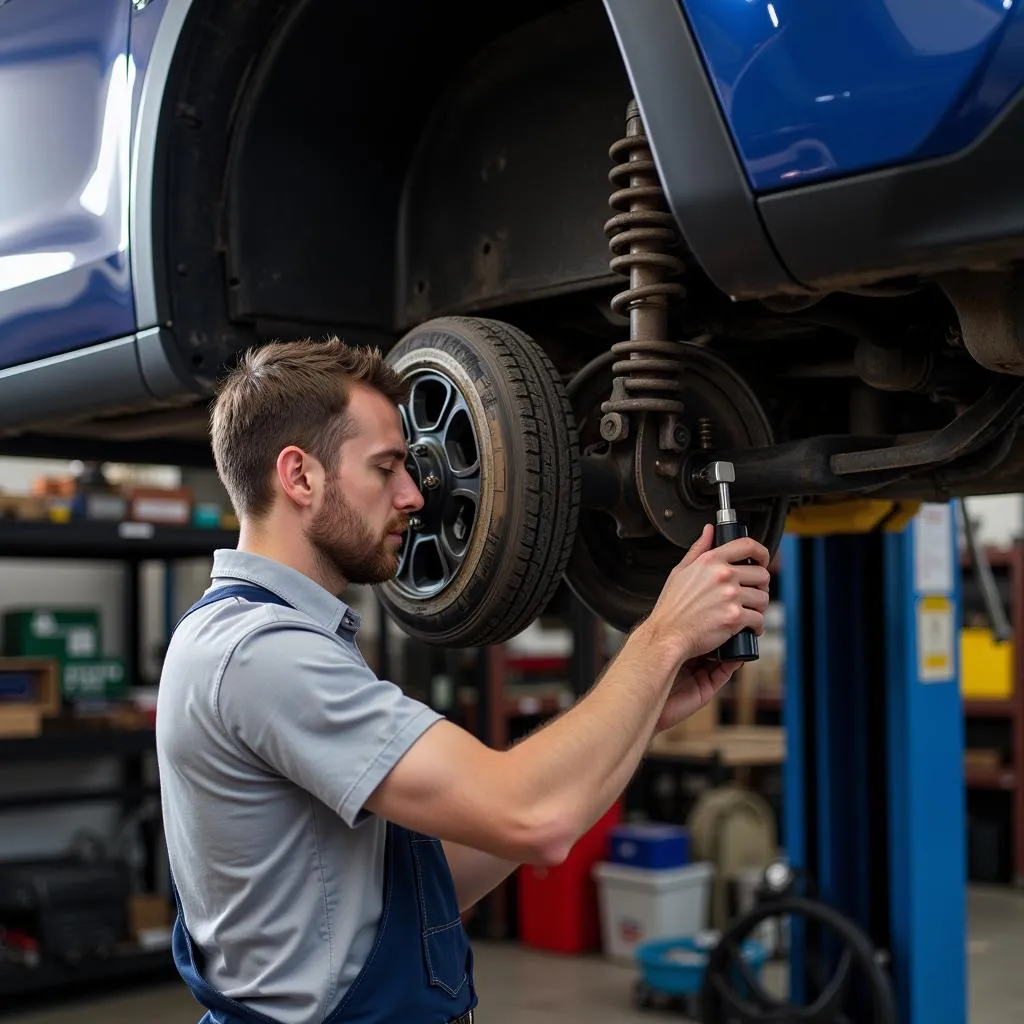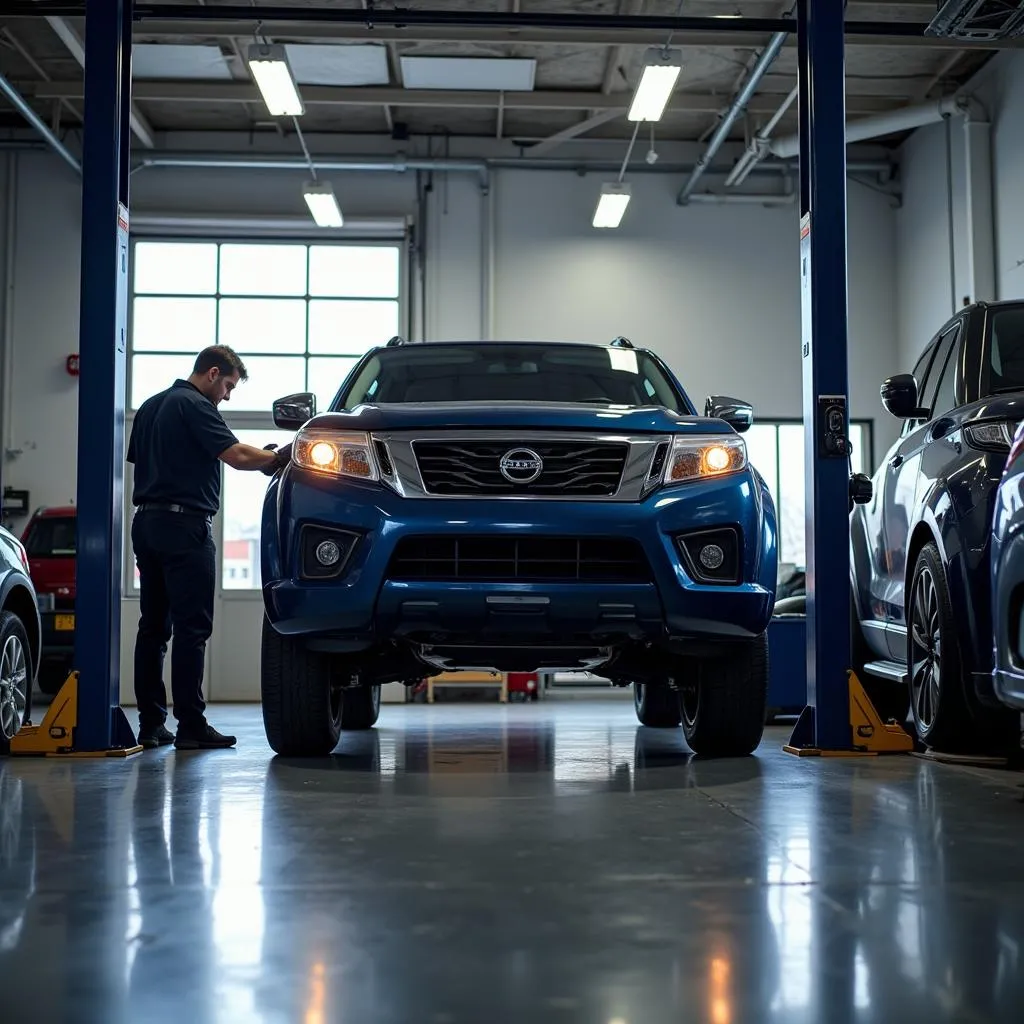Experiencing a loud vibration when driving can be a jarring and concerning issue. Not only is it unpleasant, but it can also indicate a serious problem with your vehicle. This article will explore the common causes of loud vibrations, how to diagnose them, and the solutions to get you back on the road smoothly and safely.
 Car Vibrating While Driving
Car Vibrating While Driving
Common Causes of Loud Vibration When Driving
Understanding what causes these vibrations is the first step to finding a solution. Vibrations can stem from various components of your car, and pinpointing the source requires a systematic approach. Here are some of the most common culprits:
1. Tire and Wheel Problems
Your tires and wheels are the most common culprits for vibrations, especially those felt through the steering wheel and floorboard.
- Unbalanced Tires: When tires aren’t properly balanced, they can cause vibrations at certain speeds, usually between 50-70 mph.
- Misaligned Wheels: If your wheels are misaligned, it can lead to uneven tire wear and vibrations that worsen as you accelerate.
- Damaged Tires: Bulges, bubbles, or flat spots on your tires, often caused by hitting potholes or curbs, can throw off the balance and cause vibrations.
2. Worn-Out Engine Mounts
Engine mounts secure your engine to the vehicle’s frame, absorbing vibrations and keeping it stable. Over time, these mounts can wear down, leading to excessive engine movement and noticeable vibrations, particularly when accelerating or decelerating.
3. Faulty Axle Components
Your axles play a critical role in transferring power from the engine to the wheels.
- Worn CV Joints: Constant Velocity (CV) joints allow for smooth power transfer while turning. Damaged CV joints, often accompanied by a clicking sound, can cause vibrations during acceleration.
- Bent Axle: A bent axle, often resulting from an accident or impact, can cause significant vibrations at various speeds.
 Mechanic Inspecting Car Axle
Mechanic Inspecting Car Axle
4. Brake System Issues
- Warped Brake Rotors: If you experience vibrations when braking, warped rotors are a likely cause. These uneven surfaces create a pulsing sensation in the brake pedal and steering wheel.
5. Steering and Suspension Components
- Loose or Worn Suspension Parts: Worn ball joints, tie rod ends, or control arm bushings can cause vibrations and affect your car’s handling.
- Steering System Problems: A loose steering rack or worn-out power steering pump can also contribute to vibrations, especially at higher speeds.
Diagnosing the Vibration
Identifying the source of the vibration is key to determining the correct repair. Here’s how you can narrow down the possibilities:
- Pay Attention to When the Vibration Occurs: Does it happen when accelerating, decelerating, braking, or at specific speeds?
- Note the Location: Do you feel the vibration in the steering wheel, floorboard, or throughout the entire vehicle?
- Listen for Any Unusual Noises: Are there any clicking, clunking, or grinding sounds accompanying the vibration?
- Inspect Your Tires: Look for any visible signs of damage, uneven wear, or bulges.
- Check Your Fluid Levels: Ensure your power steering fluid and brake fluid are at the proper levels.
Solutions for Loud Vibration When Driving
Once you’ve identified the potential source of the vibration, it’s time to explore solutions:
- Tire and Wheel Issues: Have your tires balanced and rotated regularly. If necessary, get your wheels aligned. Replace damaged tires promptly.
- Engine Mount Problems: Worn engine mounts will need to be replaced.
- Axle Component Issues: Damaged CV joints or a bent axle typically require professional repair or replacement.
- Brake System Problems: Warped brake rotors may need to be resurfaced or replaced.
- Steering and Suspension Problems: Have a mechanic inspect your steering and suspension components and replace any worn-out parts.
 Car on Lift for Inspection
Car on Lift for Inspection
Preventing Future Vibrations
Regular vehicle maintenance is crucial for preventing vibrations and ensuring a smooth ride:
- Schedule Routine Maintenance: Follow your car manufacturer’s recommended maintenance schedule for tire rotations, wheel alignments, and fluid checks.
- Inspect Your Tires Regularly: Check your tires monthly for signs of wear and tear, and address any issues promptly.
- Drive Cautiously: Avoid potholes and curbs, which can damage tires and other components.
When to See a Mechanic
While some vibration issues can be minor, others indicate serious problems that require professional attention. If you experience any of the following, consult a mechanic immediately:
- Sudden or Severe Vibrations: Any abrupt change in vibration intensity could signal a serious problem.
- Vibrations Accompanied by Other Symptoms: This could include pulling to one side, unusual noises, or warning lights on your dashboard.
- Difficulty Steering or Braking: Vibrations that affect your vehicle’s control can be extremely dangerous.
Conclusion
Experiencing loud vibrations while driving is not something to ignore. By understanding the potential causes and solutions, you can address the issue promptly and keep your vehicle running smoothly. Regular maintenance, prompt repairs, and a keen awareness of your car’s behavior are essential for preventing vibrations and ensuring a safe and enjoyable driving experience.
FAQs
1. Can a bad alignment cause vibrations at all speeds?
While misalignment often causes vibrations that worsen with speed, severe misalignment can cause vibrations at all speeds.
2. How often should I balance my tires?
It’s generally recommended to have your tires balanced every 5,000 to 7,500 miles, or sooner if you notice vibrations.
3. Can I drive with a loud vibration?
It’s not advisable to drive with a loud vibration, as it may indicate a serious safety concern. It’s best to have it diagnosed and repaired promptly.
4. Are vibrations covered under warranty?
Warranty coverage for vibrations depends on the cause and your specific warranty terms. Consult your warranty documentation or dealer for details.
5. How much does it cost to fix vibrations?
The cost to fix vibrations varies widely depending on the cause and the necessary repairs. Simple tire balancing might cost under $100, while replacing major components like axles can cost significantly more.
Related Resources
For further information on car diagnostics and solutions, explore these helpful resources:
- Code Scanner App: Learn about convenient tools for diagnosing engine codes.
- Automatic OBD: Discover the benefits of automatic On-Board Diagnostics systems.
- Auto Scanner Software for Laptop: Explore advanced diagnostic software for your computer.
- Bosch Scanner: Find out more about high-quality diagnostic scanners from Bosch.
If you’re experiencing loud vibrations while driving, don’t hesitate to contact our team of experts at WhatsApp: +1(641)206-8880, Email: [email protected] Or visit us at: 276 Reock St, City of Orange, NJ 07050, United States. We’re available 24/7 to assist you.